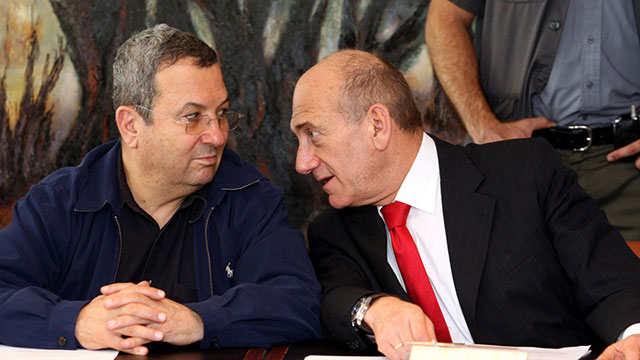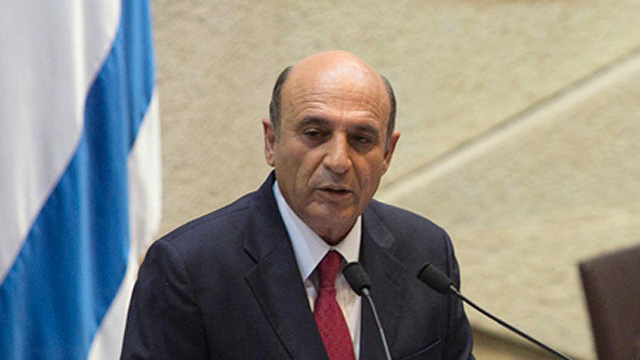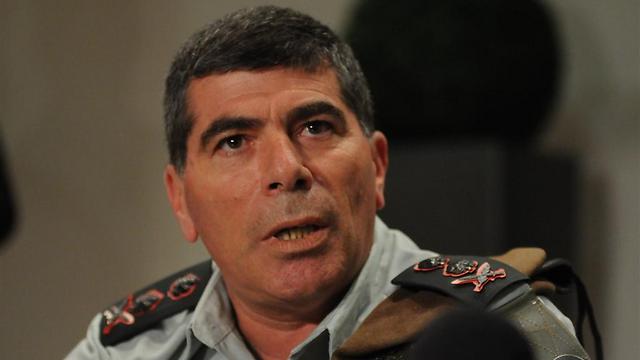
Former Prime Minister Ehud Olmert (L) and former Defense Minister Ehud Barak
צילום: אבי אוחיון, לע"מ
Plenty of credit to go around in Syrian reactor strike
Analysis: The discussions, arguments and interests that led to one of the most successful military operations conducted by Israel in its 70 years of independence.
One thing is indisputable: The attack on the North Korean nuclear reactor in Syria was one of the most successful military operations conducted by Israel in its 70 years of independence.


 Olmert, too, was convinced that Barak's motives were political. In the summer of 2007, he was a prime minister with very little public support. Barak could have assumed that Olmert would be forced to resign within several months, and that the country would head to elections, in which the Labor Party would face Kadima, a party which had lost both its founding father and his successor. Whoever gets to lead Kadima, either Livni or Mofaz, would be defeated by Barak in the polls. And Netanyahu, with just 12 Knesset seats at the time, wouldn’t be able to make a comeback.
Olmert, too, was convinced that Barak's motives were political. In the summer of 2007, he was a prime minister with very little public support. Barak could have assumed that Olmert would be forced to resign within several months, and that the country would head to elections, in which the Labor Party would face Kadima, a party which had lost both its founding father and his successor. Whoever gets to lead Kadima, either Livni or Mofaz, would be defeated by Barak in the polls. And Netanyahu, with just 12 Knesset seats at the time, wouldn’t be able to make a comeback.
The operational part, which began with intelligence suspicions, continued with a heroic gathering of information and ended in a surgical airstrike, was completed as planned: The reactor was destroyed to the ground, the project was dead, and Syrian President Bashar Assad was left with plausible deniability that prevented the region from deteriorating to war.
The operational part is fascinating. As I write these words, the full details have yet to be cleared for publication in Israel, although extensive segments have been published in the global press.

Olmert and Barak were old friends. As soon as Barak entered the Defense Ministry, they turned into arch-enemies
The main drama took place at the Prime Minister's Residence on Jerusalem's Balfour Street, in the course of Friday meetings in the presence of a very small forum: Three ministers, heads of the security organizations, senior officials from the Prime Minister's Office and the head of Israel's Atomic Agency Commission. Later on, the information was shared with the cabinet ministers as well.
The discussions went on for six months. The prime minister was Ehud Olmert; the defense minister was Amir Peretz, who was later replaced with Ehud Barak; and the foreign minister was Tzipi Livni. The discussions were held on the background of the lessons drawn from the 2006 Second Lebanon War and public pressure to topple the government, which was fueled by then-opposition leader Benjamin Netanyahu, foreign funds and the settler establishment.
In March 2007, when it became clear beyond any doubt that the facility being built in Deir ez-Zor was a nuclear reactor for military purposes, all those involved—in the political echelon, in the IDF and in the Mossad—agreed that the solution was destruction and there was no other solution. Any attempt to solve the problem through diplomacy would lead to grave results: Assad would play for time while advancing the reactor's construction, and Israel would lose the element of surprise.
The question was who would attack the reactor, the United States or Israel, when would the operation be carried out and how, and what might happen the next day.
Olmert navigated the discussions thoroughly. It was his finest hour, the highlight of his troubled political career. His conduct earned the praise of defense establishment heads, rival cabinet ministers and foreign leaders, especially US President George W. Bush. He knew what he wanted and knew how to get there.
On September 4, 2007, Olmert convened the cabinet ministers for a decisive discussion and vote. The general feeling among the ministers was that this was a critical day in the state's history and a critical day in the life of each and every one of them. At the end of the meeting, they all voted in favor of the operation, apart from Minister Avi Dichter, who voted against it for reasons he had trouble explaining.
Dichter wasn't considered an important factor in the long process the political echelon had gone through. The ministers had learned not to take his opinions seriously. But Barak was a factor and Livni was a factor, and so was Shaul Mofaz, a former chief of staff and defense minister. Barak pushed for a delay in the decision, Livni favored one of the options, and Mofaz was against the whole thing.
In one of the preliminary discussions, Isaac Herzog recalls, Mofaz lashed out at Olmert: "You're looking for a second chance!" In other words, Mofaz accused Olmert of wanting to bomb the reactor to recover from the Lebanon war. Olmert stared at him, and held back. Are you sure you want to be recorded as someone who voted against?" he asked Mofaz on the day of the vote. Mofaz voted in favor of the operation.

Cabinet member Mofaz lashed out at Olmert, 'You're looking for a second chance!' (צילום: אוהד צויגנברג)
In June 1981, Israel Air Force planes bombed the Osirak nuclear reactor in Iraq. The prime minister at the time was Menachem Begin. The plan was to avoid claiming responsibility, thereby allowing Iraqi leader Saddam Hussein to avoid retaliation. Begin changed his mind, and broke his silence. Elections were on the way, and Begin realized that the successful strike would have a major impact on the results. In a dramatic speech, he described the reactor as an existential threat to the Jewish people, as a second holocaust.
The same existential anxiety was in the air as Olmert and his government prepared to destroy Syria's al-Kibar reactor. "That vote, that moment, was worth the time I spent in public life," one of the cabinet members said this week. But the Israelis at home had no idea. Politically, it meant Olmert—unlike Begin—wouldn’t be able to translate the results of the operation into ballots.
Amir Peretz served as defense minister in the first three months after the arrival and verification of the information about the reactor. In June, he was replaced by Barak, who had won the Labor primary elections.
Olmert and Barak were old friends. As soon as Barak entered the Defense Ministry, they turned into arch-enemies. Facts aren't enough to explain what happened—it all depends on the interpretation. The reactor affair wasn't the only battlefield. There was also Barak's desire to reach a "hudna" (truce) with Hamas and their arguments during Operation Cast Lead in Gaza, and there of course the fight over the significance of the investigations against Olmert and the Winograd Commission's recommendations.
Less than three months passed between Barak's appointment and the attack on the reactor. Throughout this period, Olmert kept pushing for an operation and Barak kept delaying it. It wasn't a long period of time, but there was a strong fear that the opportunity would be missed, either due to a leak or due to the reactor's activation. Mossad Director Meir Dagan, IDF Chief of Staff Gabi Ashkenazi, Intelligence Military Directorate chief Amos Yadlin and Planning Directorate head Ido Nehoshtan pushed for action. Barak blocked them.

Then-IDF chief Gabi Ashkenazi. While the security establishment heads pushed for action, Barak wanted to wait (צילום: ירון ברנר)
Barak's counterclaim is convincing, to a certain limit: I had to make sure that if the attack on the reactor would lead to a war with Syria, the IDF would be prepared. This argument convinced some members of the cabinet, who somewhat lost faith in the IDF's abilities following the Second Lebanon War.
In Barak's defense, it should be noted that he demanded to check and delay and delve into the details just like Prime Minister Yitzhak Rabin had done during the preparations for Operation Entebbe. Defense Minister Shimon Peres had pushed for action, while Rabin had insisted on checking. Not to mention the fact that an individual operation wasn’t the only thing on the agenda —there was a potential war as well.
But Barak lost some of persuasion abilities when he said, at a later stage, that "even if the reactor is activated, we'll find a way to destroy it." IDF officers failed to understand which professional source Barak had drawn this idea from. They concluded that he had ulterior motives.
Behind the scenes of Israel's strike on the Syrian reactor (Video: Yaron Sharom) (צילום: ירון שרון | תסריט עריכה ואנימציה: תמר אברהם | בימוי: אסף קוזין)
According to this version, Barak didn’t want Olmert to get all the fame. He wanted to get the fame himself: He would be prime minister and he would destroy the reactor. This argument against Barak is strengthened by the fact that after Olmert stepped down in March 2009, Barak wasn't keen on helping Livni form a government. He went to elections, from which Netanyahu emerged as prime minister.
The explanation may be simpler: Barak didn't accept Olmert's authority as prime minister. He had a lot of appreciation for him as a politician, but he was unwilling to follow his lead when it came to security-related issues.
Several hours after the operation, Barak met Isaac Herzog. One would have expected him to be concerned, as Assad might have been preparing his missile arsenal for an attack on Israel. But Barak was delighted. "There's plenty of credit to go around," he said.
In the end result, Barak's favorite term, he is right; but when it comes to the process, he is wrong: The reactor affair affected not only Olmert and Barak's ability to keep working together, but also the IDF top echelon's faith in Barak.












